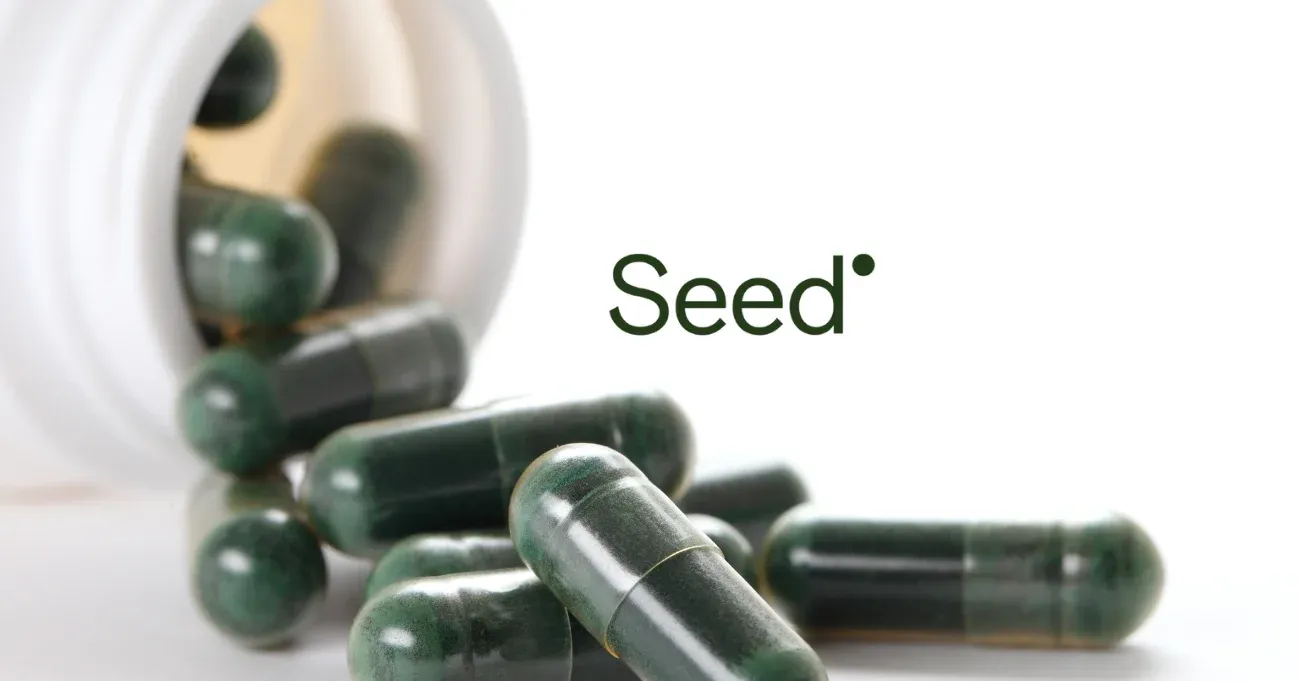
The gut is a cornerstone of health, impacting digestion, immune function, and even mental well-being. Seed Probiotics is a leading company that is changing the way we think about gut health. Their proprietary formula, the Seed Daily Synbiotic, has 24 artfully selected probiotic strains to help with digestive function, enhance immune response, and foster mental well-being.
Nudge, meanwhile, is a pointed solution for small intestinal bacterial overgrowth (SIBO) symptoms by addressing various health conditions. Specializing in digestive supplements, Nudge covers various nutritional needs to target the root causes of SIBO, including gut motility, dietary deficiencies, and stress. The all-in-one supplement, which includes 12 ingredients, aims to support healthy nutrition, promote regularity, and alleviate digestive discomforts.
Our comprehensive analysis is grounded in the scientific principles behind Seed Probiotics and the company’s unique approach. We’ll examine its health benefits, mechanisms of colonization, interactions with gut microbiota, and nutritional profiles. Such formulations will provide valuable insight into how these products can help improve your digestive health and overall well-being.
Let’s jump in!
What Are Seed Probiotics?
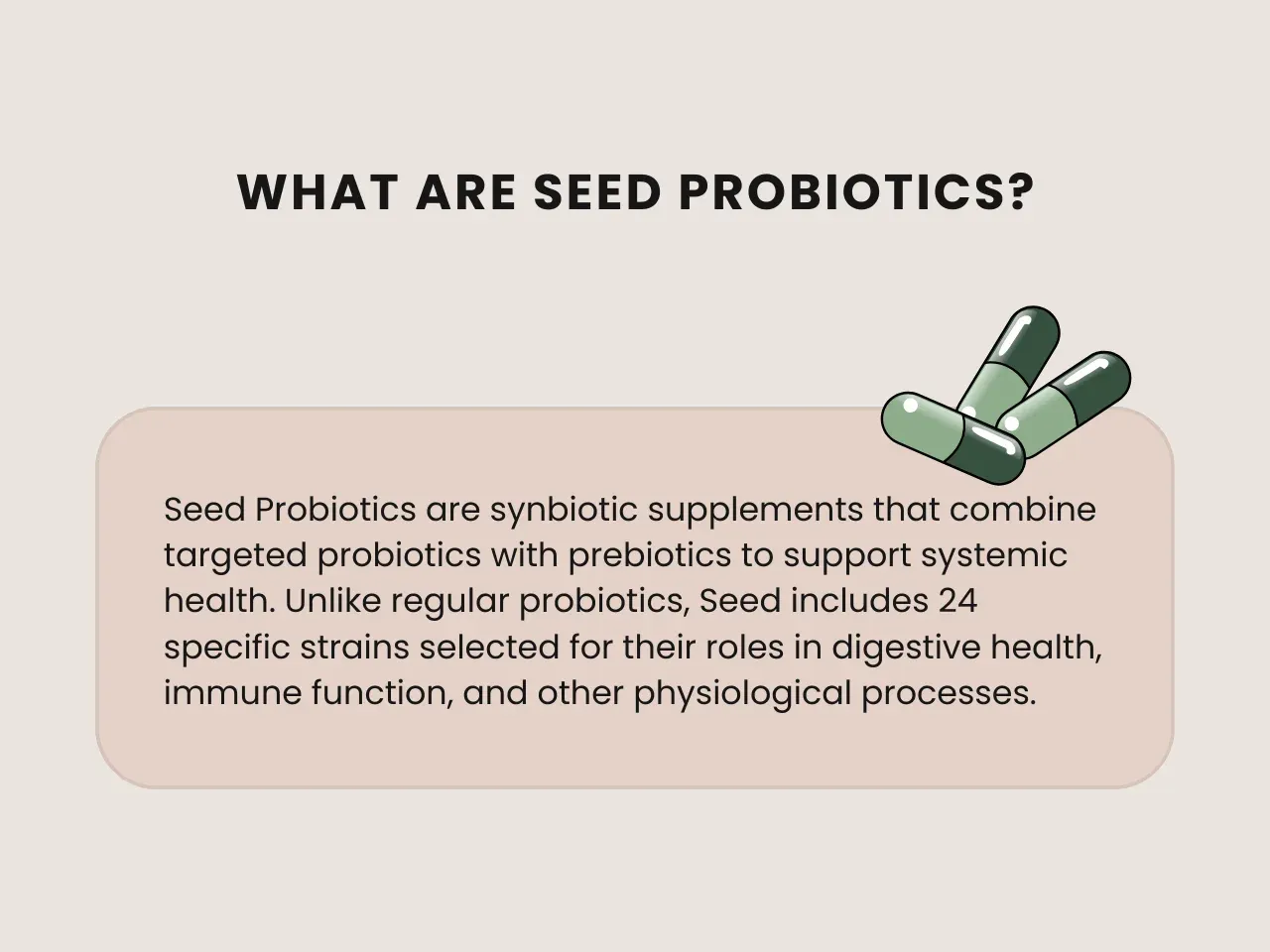
Seed Probiotics are synbiotic supplements that combine targeted probiotics with prebiotics to support systemic health. Unlike regular probiotics, Seed Probiotics features 24 specific strains selected for their roles in digestive health, immune function, and other physiological processes, offering targeted benefits beyond digestive support.
Seed also uses advanced encapsulation technology to enhance effectiveness. The dual-capsule system shields the probiotics from stomach acid and digestive enzymes so that they reach the gut intact. This dramatically improves the stability and potency of the probiotics and, hence, their effectiveness compared to characteristic old ones.
Nutritional Profile of Seed Probiotics
Seed Probiotics is a formula with an in-depth nutrition profile that addresses various aspects of gut health and mitigates gastrointestinal symptoms. Importantly, Seed Probiotics is free from dairy products, making it suitable for individuals with dairy sensitivities. The formula contains live microorganisms, and their safety and benefits for gut health and overall well-being have been evaluated in clinical trials.
Probiotic Content
- DS-01 Daily Synbiotic: This formula contains 24 strains of probiotics and a total of 53.6 billion AFU units per serving. It includes representative species from the Lactobacillus and Bifidobacterium genera, including Bifidobacterium longum, selected based on their evidence for gut health, immune function, and overall microbiota balance.
- PDS-08 Pediatric Daily Synbiotic: The formulation contains nine different types of probiotic strains, thereby assuring a potency of 17 billion AFU per dose. It is designed with children's health in mind and includes strains that have been well-researched for safety and effectiveness in pediatric patients.
Prebiotic Content
- DS-01 Daily Synbiotic: Made with organic rice fiber, which acts as a prebiotic nutrient that nurtures the beneficial bacteria in the gut. Such fiber contributes to a balanced microbiota within the gut and supports optimal digestive health.
- PDS-08 Daily Pediatric Synbiotic: Contains inulin and fructo-oligosaccharides from the chicory plant, which nourishes the healthy bacteria responsible for a healthy gut in children.
Encapsulation Technology
- Bio-Shielding: Unique multi-layered encapsulation technology safeguards probiotics from gastric acid and bile degradation. The bio-shielding ensures more viable probiotics reach the intestines, where they can exert a beneficial effect.
How Seed Probiotics Colonize and Interact with Gut Microbiota
The probiotics in Seed enter the stomach through the gastrointestinal path and into the first acidic environment. Seed knows delivering live bacteria to the gut can be challenging. Stomach acid can kill helpful microbes, making many traditional probiotics ineffective. Discover how a dual capsule system works to protect the survival of this probiotic strains throughout the journey of digestion:
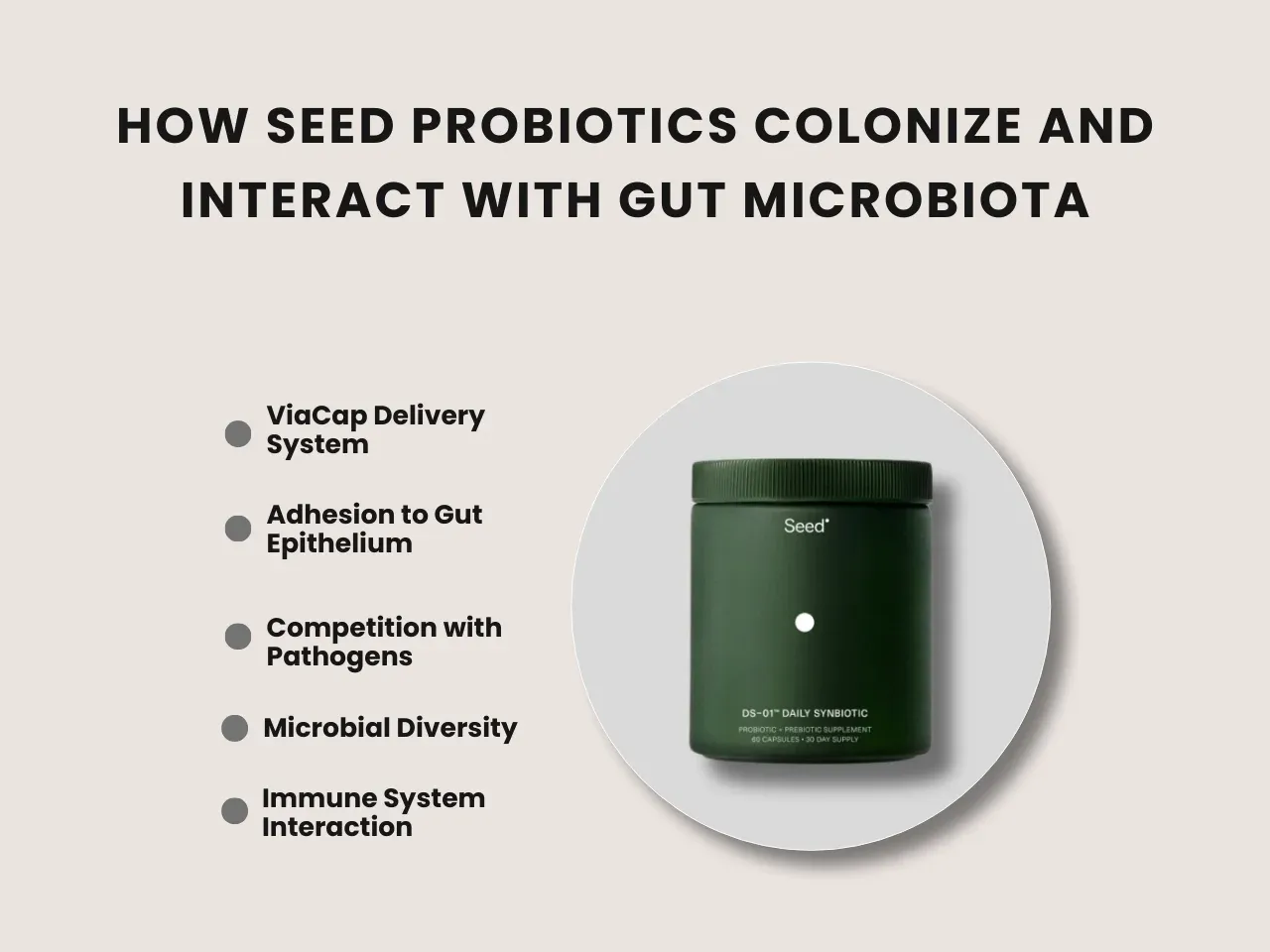
ViaCap Delivery System
Seed DS-01 utilizes a unique ViaCap delivery system that encapsulates the probiotics around a protective layer to protect them from the stomach's acidic environment. The system aims to improve the probiotics' ability to survive the passage through the stomach to the intestines.
The ViaCap delivery system ensures the release of probiotics in the intestines, where their effects can be fully manifested. This system uses a dual-layered capsule to create an acid-resistant barrier and releases the probiotic microorganisms at active sites within the gut.
Adhesion to Gut Epithelium
Probiotics must adhere to the intestinal epithelium to exert their effects. Strains used in Seed DS-01 have specific adhesion properties that allow them to attach to the gut lining. This adhesion is crucial for colonizing and establishing a stable microbial population.
Adhering to the gut epithelium allows these probiotics to interact effectively with the microbiota and immune cells, supporting microbial balance and gut health. The adhesion properties of Seed DS-01 strains ensure a prolonged presence in the gut, leading to sustained probiotic benefits, including improved digestion, enhanced immune response, and overall gastrointestinal health.
Competition with Pathogens
Probiotics can compete with nutrition and binding sites on intestinal mucosa against pathogenic microorganisms. Such competitive exclusion reduces the incidence of harmful bacteria, therefore facilitating the growth of gut microbiota.
Probiotics prevent the growth and colonization of pathogenic organisms by occupying available niches and utilizing essential nutrients. The competitive advantage reduces harmful bacteria load and stabilizes a healthy microbial community within the gut.
Microbial Diversity
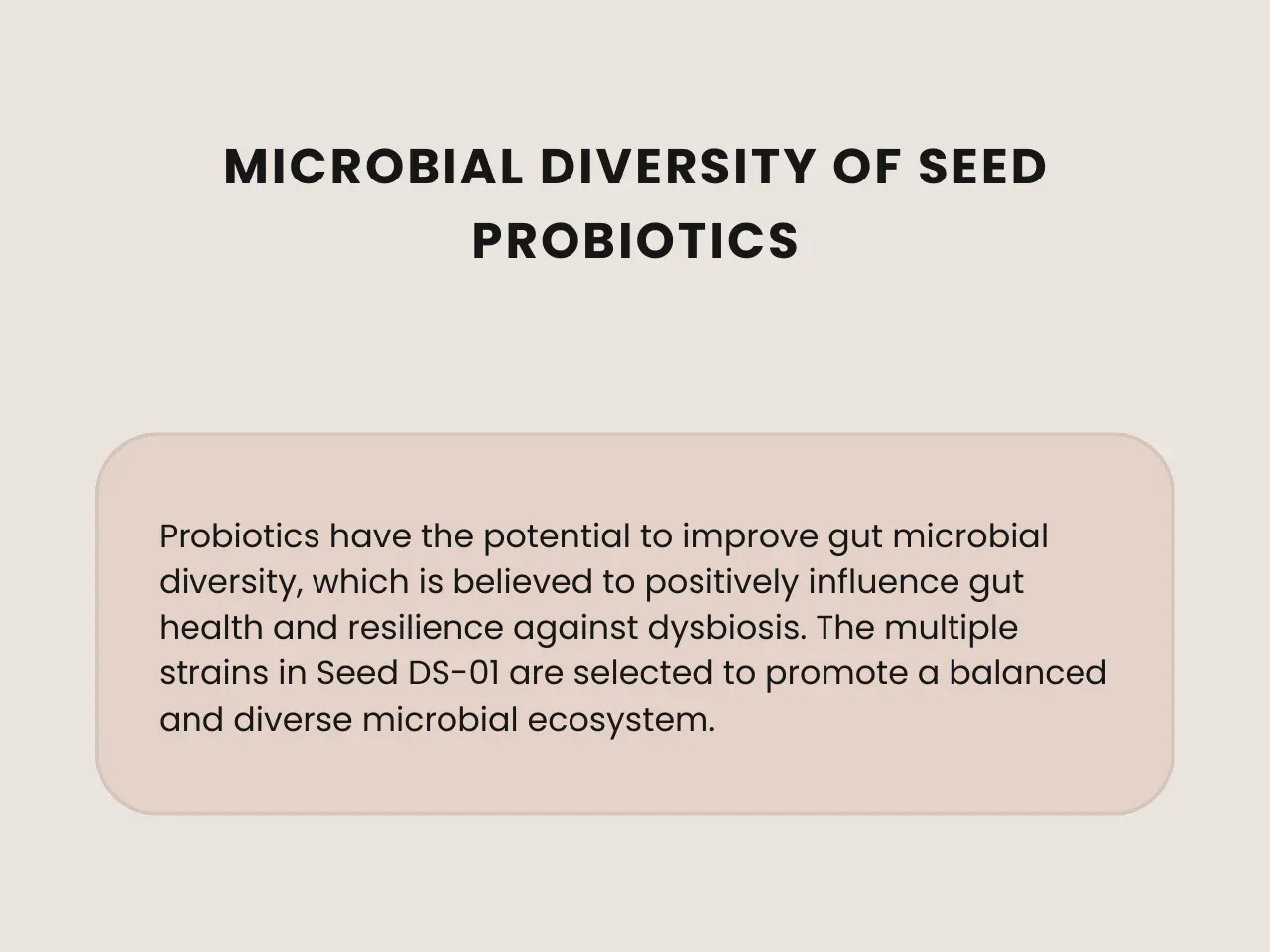
Probiotics have the potential to improve microbial diversity in the gut. Diversity is considered to influence good gut health and resilience against dysbiosis positively. The multiple strains in Seed DS-01 are selected to promote a balanced and diverse microbial ecosystem.
With increased microbial diversity, the range of beneficial probiotic bacteria also expands. This tends to promote a more adaptable and resilient gut environment. It helps stabilize the gut microbiota, acting against potentially harmful microorganisms and improving overall gut function.
Immune System Interaction
Probiotics can modulate the immune response by interacting with gut-associated lymphoid tissue (GALT). This interaction further enhances mucosal immunity and, to that respect, systemic immune responses for maintaining immune health.
Probiotics interact with gut-associated lymphoid tissue, thus playing an essential role in shaping immune responses at the mucosal level. This interaction strengthens the mucosal barrier and enhances the production of protective antibodies and cytokines.
The Impact of Seed Probiotics on Gut Microbiota and Overall Health
Seed Probiotics contribute significantly to overall health by supporting a balanced gut microbiota. A well-balanced gut microbiota is linked to improved digestive health, enhanced immune function, and better nutrient absorption. These effects underscore the broad benefits for human health and the proper functioning of the human body:
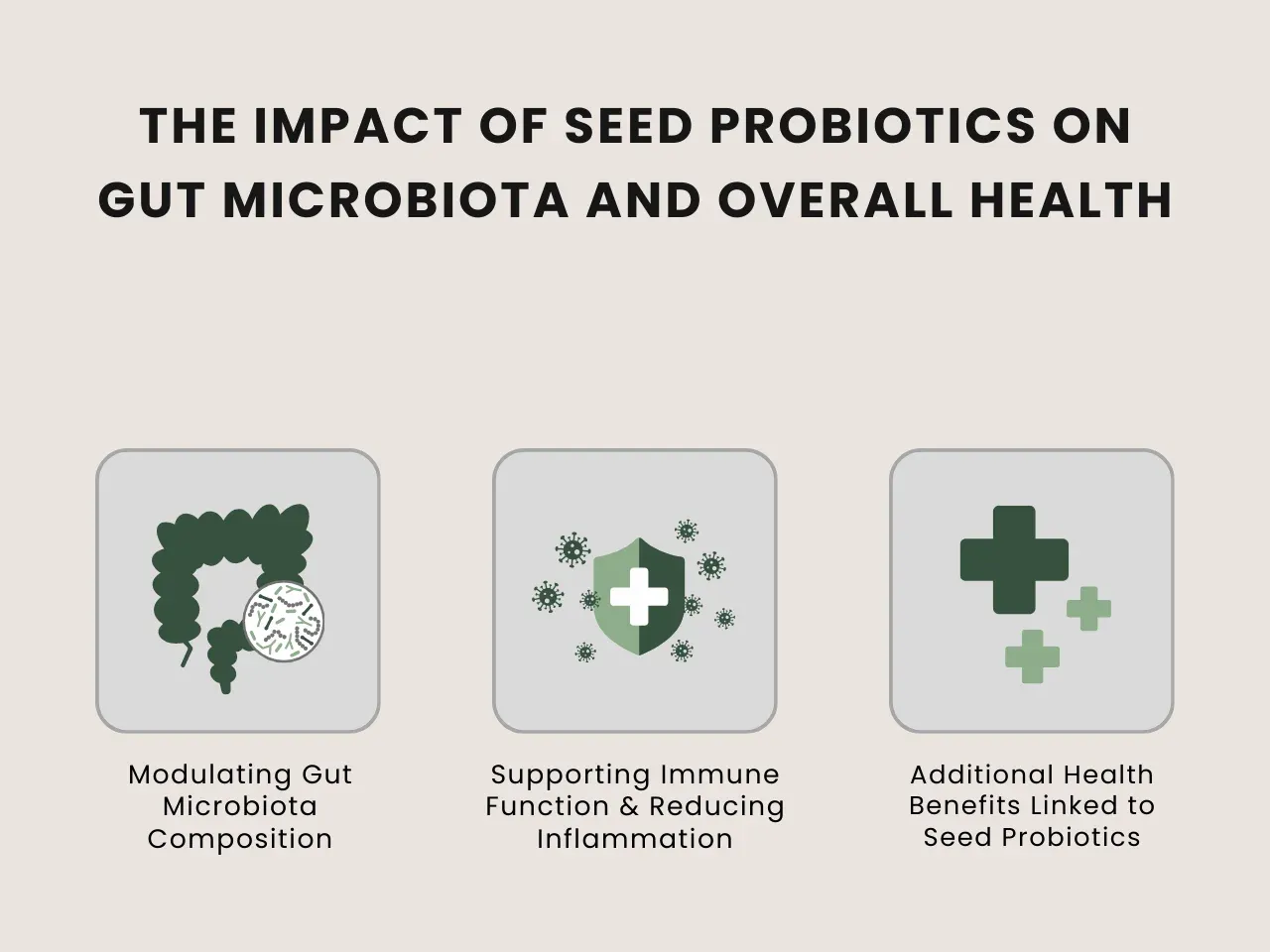
Modulating Gut Microbiota Composition
Seed Probiotics can significantly influence gut microbiota composition by introducing beneficial microorganisms that enhance microbial diversity. This diversification is essential for maintaining a balanced gut environment and supporting overall gastrointestinal health. Seed Probiotics contribute to this balance through the following:
- Restoration of Microbial Diversity: Seed Probiotics promote a diverse gut microbiota by introducing a variety of strains that contribute to a more balanced microbial environment. This restoration helps maintain healthy gut flora, which is crucial for optimal digestion and overall health.
- Influence on Gut Barrier Integrity: Seed strengthens the gut lining, which helps prevent health conditions such as leaky gut syndrome. These probiotics support a healthy mucosal layer, reducing the risk of systemic inflammation and improving gut function by enhancing the gut barrier's integrity.
Supporting Immune Function and Reducing Inflammation
Seed Probiotics play a pivotal role in supporting immune function and managing inflammation. They contribute to a more robust immune response and a balanced inflammatory state by influencing the immune system and gut microbiota. Explore how Seed supports these critical aspects of health:
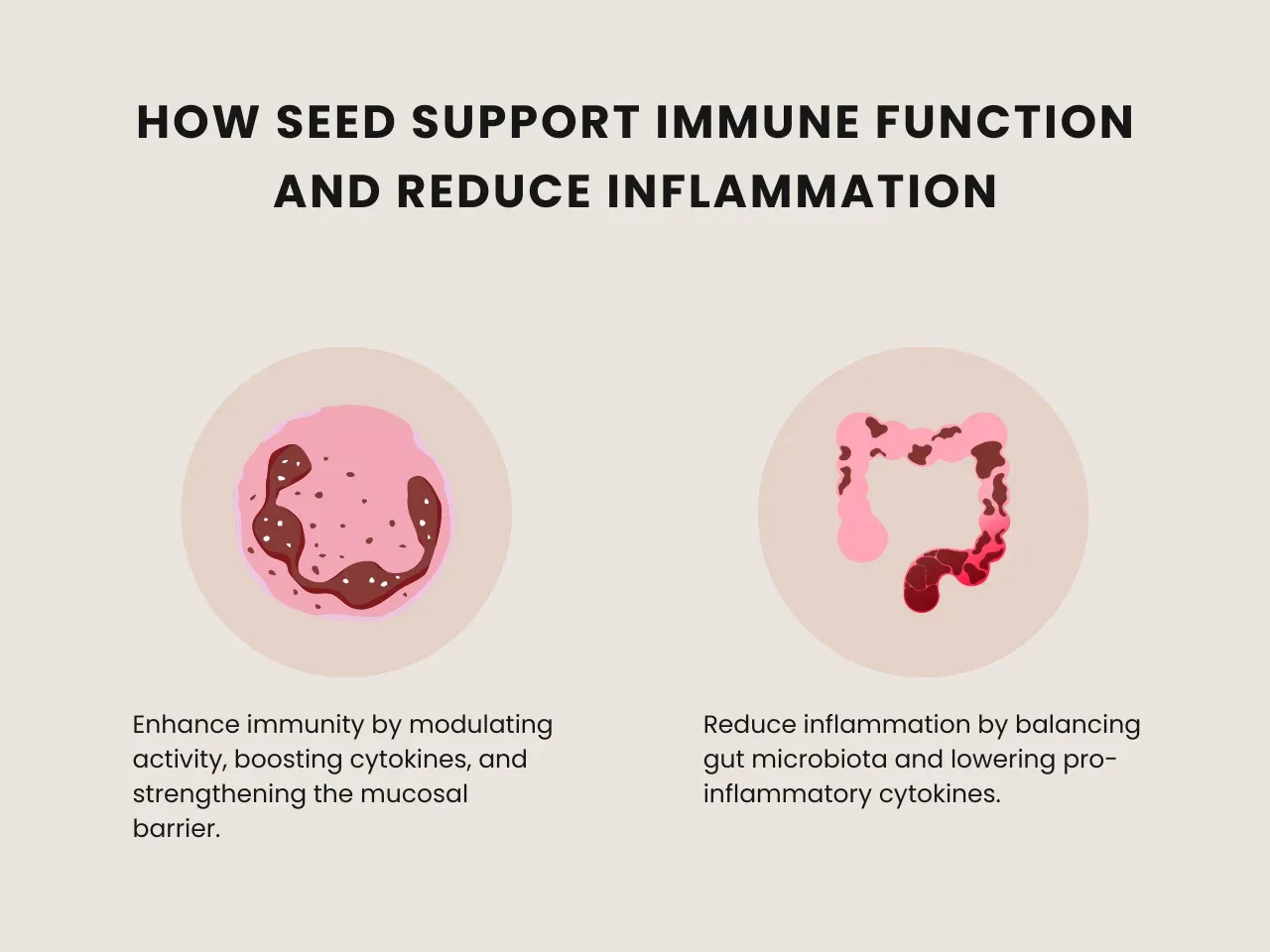
- Immune Modulation: Seed Probiotics enhance immune cell response by modulating immune system activity. They stimulate the production of beneficial cytokines and strengthen the mucosal immune barrier, which improves the body’s ability to reduce the risk of infections.
- Anti-inflammatory Properties: They help lower systemic inflammation by balancing the gut microbiota, decreasing the production of pro-inflammatory cytokines, and supporting a healthier inflammatory response. This can be particularly beneficial for managing conditions like inflammatory bowel disease (IBD), where controlling inflammation is crucial.
Additional Health Benefits Linked to Seed Probiotics
Seed Probiotics offer a range of additional health benefits beyond gut health, impacting both mental and metabolic well-being. Their health effects on the gut microbiota can influence various physiological processes, improving overall health. Check out how Seed supports these areas:
- Mental Well-Being (Gut-Brain Axis): Research suggests that Seed positively impacts mental health through the gut-brain axis. Influencing the gut microbiota can affect neurotransmitter production, modulate stress responses, and impact the nervous system, leading to improved mental well-being.
- Metabolic Health: Seed improves metabolic health by enhancing nutrient absorption and modulating glucose metabolism. They may aid in weight management and improve metabolic function by supporting a balanced gut microbiome, which regulates appetite and insulin sensitivity.
- Skin Health: Seed Probiotics support dermatological health by reinforcing the gut-skin axis. This includes promoting the synthesis of essential micronutrients such as folate and vitamin B12. They may also aid in managing atopic dermatitis, a chronic inflammatory skin condition, by improving overall skin health and reducing associated symptoms.
5 Tips When Incorporating Seed Probiotics into Your Diet Plan
The health benefits of probiotics extend beyond mere digestive health, offering potential improvements in various physiological processes. When addressing digestive problems, incorporating Seed Probiotics into your diet can be an effective strategy. However, consider the following guidelines to optimize the benefits and minimize potential side effects:
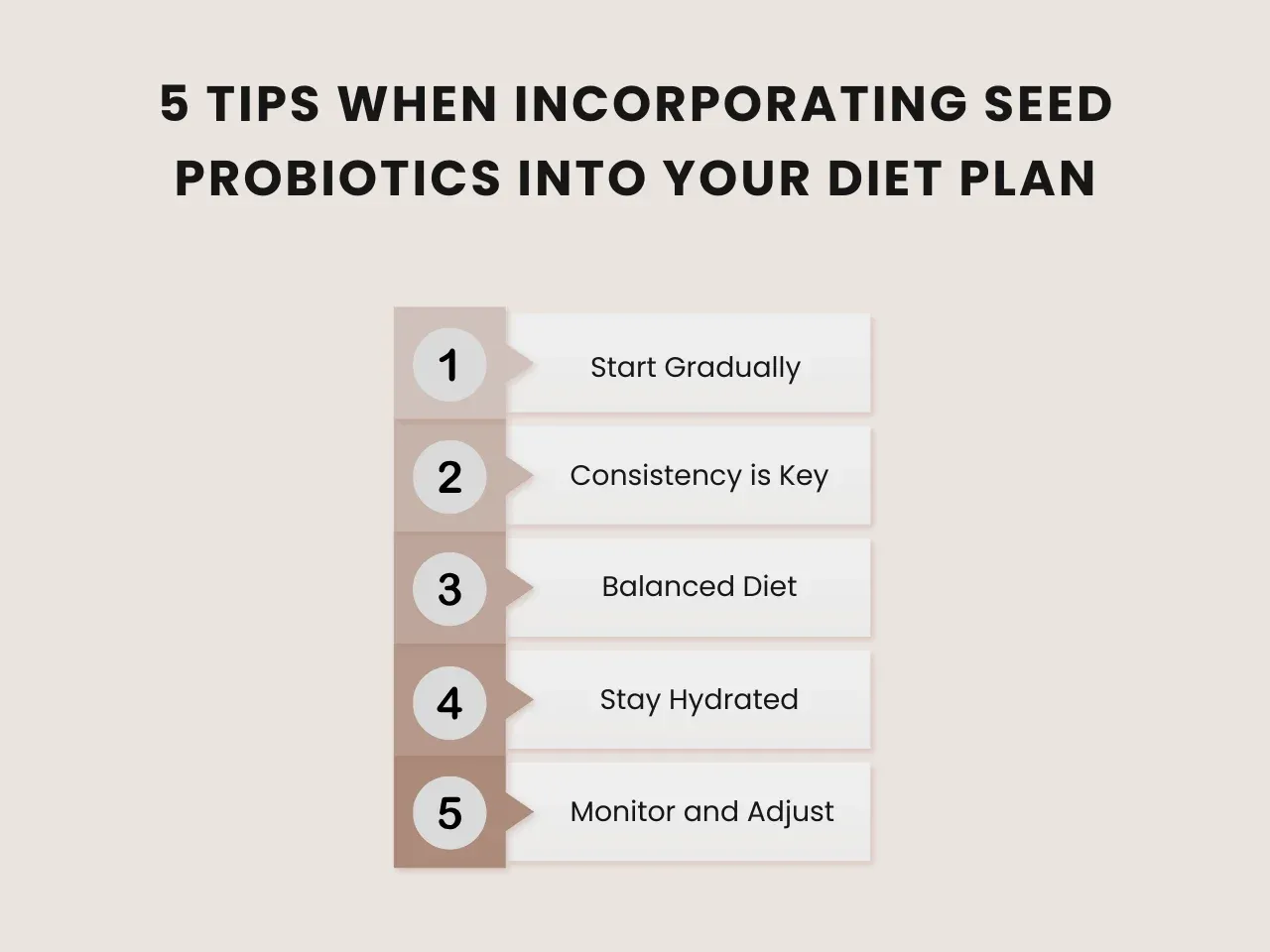
Tip 1: Start Gradually
Introduce Seed Probiotics slowly into your diet, starting with a lower dosage and gradually increasing based on how your body reacts. This allows the gut microbiota to acclimate to the new probiotic strains without overwhelming the digestive system.
Formatting with a lower dose reduces potential side effects, such as increased bloating or gas, as the gut flora shifts. This gradual increase is assumed to help the probiotic strains establish themselves more effectively in the gut microbiome, thus encouraging better integration and minimal perturbation.
Tip 2: Consistency is Key
Maintaining a consistent probiotic intake can help your gut maintain stable probiotic levels, which is essential for realizing and sustaining certain health benefits. When you stick to a routine, the helpful bacteria can settle in your gut.
Consistency ensures the presence of activity and the influence of probiotic strains in the gastrointestinal tract, maintaining gut microbiota balanced and functional. Regular reinforcement through intake consolidates beneficial effects like improved digestion, enhanced immune function, and better gut barrier integrity, among others
Tip 3: Pair with a Balanced Diet
Complement Seed Probiotics with prebiotic food sources like fiber-rich fruits, vegetables, and whole grains. Prebiotics serve as food for probiotics and help enhance their effectiveness by promoting their growth and activity in the gut. For individuals following a low FODMAP diet to manage IBS or other digestive conditions, selecting prebiotic foods that comply with their dietary restrictions is crucial.
Incorporating prebiotic-rich foods into your diet creates an optimal environment for probiotics to thrive. Prebiotics, such as inulin and oligosaccharides, are not digestible by human enzymes but are utilized by beneficial gut bacteria. Eating a balanced diet full of whole foods and probiotic foods like yogurt, kefir, and fermented vegetables can also help.
Tip 4: Stay Hydrated
Good hydration supports the digestion and absorption of probiotic strains. Make sure to drink adequate amounts of water throughout the day. This is especially important for older people who may experience changes in hydration levels and gastrointestinal function with age.
Water also aids digestion by keeping food moving along the gastrointestinal tract for nutrient absorption. For healthy people, proper hydration helps maintain food movement through the gastrointestinal tract, supporting nutrient absorption. This optimizes the effectiveness of dietary supplements like Seed Probiotics.
Tip 5: Monitor and Adjust
Pay attention to your body and how it tolerates Seed Probiotics. If you encounter adverse side effects or gut health problems, it's always best to consult a healthcare provider to tailor your probiotic routine and overall general health.
Monitoring your body's response to probiotic use is essential, not only for the best results with Seed but also for safety. People are different, and many individuals have initial gastrointestinal probiotic effects, such as bloating or gas, which may spontaneously resolve over time.
Key Takeaway
Seed Probiotics distinguishes itself through its unique scientific approach, which sets it apart in positively impacting gut health. Utilizing advanced encapsulation technology and broad probiotic strains, Seed Probiotics ensures effective delivery and colonization within the gut. These supplements enhance microbiome diversity, support digestive function, and contribute to overall wellness.
When integrating Seed Probiotics into your routine, assess your specific needs and underlying conditions you may have. Engaging in health care practices such as taking an irritable bowel syndrome (IBS) quiz or a SIBO test can help identify potential digestive issues and guide your selection of appropriate probiotic supplements. Seed’s approach addresses various digestive health concerns, making it suitable for a broad audience.
Ready to enhance your digestive health? Discover how Nudge can support your wellness goals and improve your gut health. Take control of your digestive health today by incorporating Nudge’s comprehensive approach into your routine.